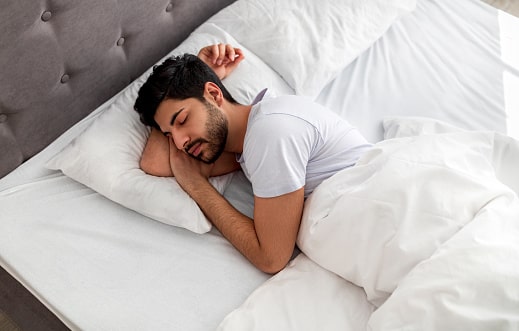Getting a good night’s sleep is crucial to maintaining a healthy lifestyle. However, getting to sleep can be difficult for some people, particularly those who struggle with anxiety or stress. If you find yourself struggling to get a good night’s rest, try implementing these 10 tips to help you relax and sleep better.
1.) Create a bedtime routine
Creating a bedtime routine can help signal to your body that it’s time to start winding down for the night. This could include activities such as taking a warm bath, reading a book, or practicing relaxation techniques. Try to keep your routine consistent each night to help your body establish a pattern. A great mattress can help, check out this Zoma mattress build.
2.) Set a regular sleep schedule
Setting a regular sleep schedule can help regulate your body’s natural sleep-wake cycle. Try to go to bed and wake up at the same time each day, even on weekends or days off. You can use the sleep tracking apps SleepScore, Sleep Cycle, and Sleep time.
3.) Limit screen time
Exposure to electronic devices, such as phones or computers, can stimulate the brain and make it harder to fall asleep. Try to limit your screen time at least 30 minutes before bed. Instead, try reading a book or listening to soothing music.
4.) Create a relaxing sleep environment
Creating a relaxing sleep environment can help signal to your body that it’s time to sleep. Make sure your room is dark, cool, and quiet. Consider using blackout curtains, a white noise machine, or earplugs if necessary.
5.) Practice relaxation techniques
Practicing relaxation techniques can help reduce stress and anxiety, making it easier to fall asleep. Techniques such as deep breathing, meditation, or progressive muscle relaxation can help relax the body and calm the mind.
6.) Avoid caffeine and alcohol
Caffeine and alcohol can disrupt sleep patterns and make it harder to fall asleep. Try to avoid consuming these substances at least a few hours before bedtime.
7.) Exercise regularly
Regular exercise can help reduce stress and anxiety and promote more restful sleep. However, avoid exercising too close to bedtime, as it can stimulate the body and make it harder to fall asleep. Use fitness apps to monitor your diet and progress, get free health and fitness tips, and track your footsteps.
8.) Use aromatherapy
Aromatherapy can help promote relaxation and restful sleep. Consider using essential oils such as lavender or chamomile, which are known for their calming properties. You could use a diffuser or add a few drops to a warm bath.
9.) Practice gratitude
Practicing gratitude can help reduce stress and promote feelings of happiness and contentment. Consider writing down a few things you’re grateful for each night before bed.
10.) Seek professional help if needed
If you find yourself struggling to sleep despite trying these tips, consider seeking professional help. A healthcare professional can help identify any underlying issues that may be contributing to your sleep difficulties and provide guidance on how to improve your sleep.



![How To Perform Basic Photo Editing Like A Pro [Step By Step Guide] How To Perform Basic Photo Editing Like A Pro [Step By Step Guide]](https://www.techpcvipers.com/wp-content/uploads/2020/05/Professional-Photo-Editing-180x180.jpg)
